 |
| Frazetta |
 |
| A strategically placed word balloon! |
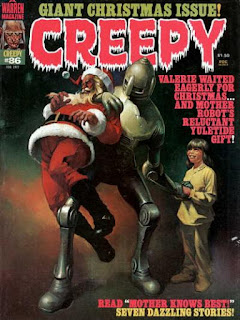 |
| Kelly |
The man identifies himself as Elbod Crooken and beckons Checky to follow him to a curtained room. Crooken pulls back the curtain and shows Checky "Dinosaur Boy," a misshapen youngster sitting on a stool on a small stage. Crooken explains that the boy is the victim of a nasty condition and earns the man his money by public display. Disgusted, Checky tells Crooken that he'll give him his "magic bag," which can grant its owner any wish he desires in return for the boy's freedom.
Crooken scoffs until Checky tells the boy to make a wish and reach into the bag. The lad pulls out a mirror that transforms him into a normal boy and Checky offers the boy a job as an elf. Crooken takes the bag as the duo exit the building and board Checky's sleigh, but the bag proves to be empty and the mean old man screams vile obscenities at the sleigh and attempts to block its takeoff. Later, the neighbors discover Crooken's broken body, hoof prints all around it in the snow.
"A Noggin at Mile End" is a pleasant enough dark fairy tale, with a nice EC-style climax. Boy, those elves can be rough customers sometimes. I wonder if Checky had to fill out a report with the boss when he got back to the plant. Leopold Sanchez's art is just right for this, although "Dino-Boy" isn't really all that much of a "freak"; nothing a good bath couldn't wash away.
The only things that keep young, sickly Peter going are his friend, Mr. Music, and the Dick Swift adventures Music reads to him. Every week, "Dick Swift and His Electric Power Ring" beat the odds and save Pearl Pureheart from the dastardly Luigi, the Pasta-Pusher! Peter has sent away for his own Power Ring, but the damned thing is taking its time getting there and, as Doc Needles keeps reminding us, the kid's time is just about up. Sensing the Postal Service will once again let down one of its customers, Mr. Music saves the day by delivering a gen-u-wine Power Ring to his favorite youngster.Peter uses the ring to fly out the window to find adventure. Needles and Peter's aunt mourn the little boy, who has died in his bed, and wonder aloud if Mr. Music might just have been something more than an imaginary companion. For the first half of "Dick Swift," I was thinking DuBay had finally hit a home run. The tale was charming and fanciful and the funny little nuggets, such as Pearl meeting her bloody end tied to the train tracks, had me laughing out loud. But, in the end, Dube couldn't help but pour on the schmaltz. Peter's endless "Oh... but doctor... I'm so very tired..." vignettes in the midst of his excitement for Dick's latest adventure were a constant reminder that we were, in fact, dealing with a very serious subject.
The art by Infantino and Wrightson is aces, absolutely gorgeous. What I like so much about it is that it appears Bernie decided Carmine's pencils were pretty special and only gave them a light dusting of inks. Frequently, I feel as though an inker (especially one established as a lead artist) wants to leave his stamp on the work. Not so here.
Louis Bay looks back on "The Greatest Christmas of All" and reveals to no one in particular how he came to be Santa Claus. One day, as a kid with a dying mother, Louis watched as a red sack fell from the sky. The amazed lad took a look inside the bag, only to discover a multitude of presents, all addressed properly. He ran home to show his momma (who was dying of asthma) and his two little sisters the present from the sky. When he got there, he was delighted to see a beautiful, green Christmas tree in the living room. Surely this was magic, as his sickly mother and dead-drunk father couldn't afford such a luxury.Louis shows his mother the bag and its magical powers and Mom, despite being very sick, insists that she and her little urchins hit the pavement and deliver the goods. After spreading the joy in a snowstorm, poor Mama's lungs give out and she drops dead. Louis and his sisters return to their dingy apartment, where their father has returned from a long night of bar-hopping. He beats Louis and steals the bag, reaching far down to the bottom to see what he can use for whiskey dough. A giant snake is what the sod receives. Story told, the adult Louis freezes to death on a city street, buried under snow.
A cheery St. Nick story! Make no mistake, I like a sadistic, bloody Christmas story as much as the next guy (see "Bless Us, Father" in #59), but "The Greatest Christmas of All" is depressing, boring, and, worst of all, pointless. Would Santa's bag really contain a giant viper, even when opened by a drunken child-beater? I kept thinking, "If this bag is so magical, why doesn't Louis pull out an inhaler for his (all together now) dying mother?" And why does this story look like it takes place in the big city, but Louis speaks as though he's from Cripple Creek? Most of all, why does a good-hearted boy grow up to die so miserably? One too many magical bag stories for one issue.
James and Valerie can't wait to see Santa Claus every Christmas and their "mother," a six-foot robot, does everything she can to oblige them. First up, she heads to the control room to fire up the manufacturing machine in order to craft gifts, then she thaws out Santa from his cryogenic sleep and awaits the glee.
This year is a little different in that the children have grown a bit older and Santa feels it's the right time to tell James the real story. They are the only survivors of a space expedition whose population was killed off by rogue robots. Now, Santa is hoping James will help him to take the ship back so that they can turn the ship around for Earth. Despite mother's protests, James blasts her and heads to the front of the ship with Santa. There, they discover the truth: the ship has crash landed on another planet. They are lost in space.We've seen Warren tout "gorgeous, vivid, full color" on their cover before, but they somehow missed the boat this time, choosing not to advertise "Half-Assed Red and Black!" Seriously, this is a very good science fiction drama, something we all know was a rarity in the Warren funny books, but what's with the two-tone gloss? I believe this was the only time such a presentation was made (outside of those disposable inside cover vignettes). The color doesn't detract from a solid Christmas entry, though. Bruce Jones does a spectacular job not steering "Mother Knows Best" towards familiar territory (who needs another take on Colossus: The Forbin Project?), and instead delivers an entertaining read with a humdinger of a final panel. Why would this mechanical matron keep the kids alive after she and her metal mates had wiped out the rest of the crew?
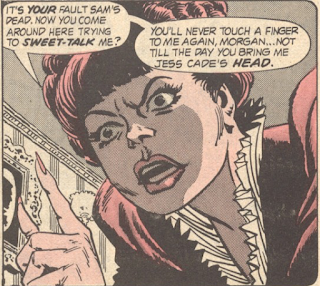 |
| That's definitely Carmine! |
Happiness came crashing to Earth when Cade and his gang decided to rob Bloodstone's sole bank on Christmas Eve and its manager surprised the robbers mid-haul. Cade cut the man in two with his shotgun, and his comrades were killed during the escape by Morgan. After the violent incident, Sarah refused the advances of her lover and blamed Morgan for her husband's death, adding that she would not forgive the sheriff until he brought her the head of Jess Cade. Three years later, with the return of the killer to Bloodstone, Morgan gives Sarah the payment she'd demanded.
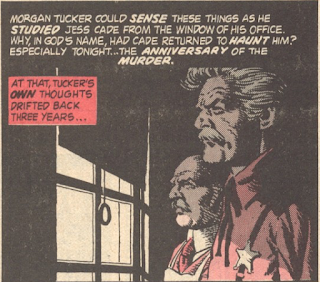 |
| Unmistakably Severin |
Was Denise's psychiatrist husband really a mad-dog killer? A year before, Jason had been accused (and acquitted) of the Christmas Eve murder of his first wife. Now, Denise is having horrible dreams of Jason performing the same crime on her. She can't sleep and Jason is out on call, so she checks on her stepson, Pualo, but the boy is sleeping like a baby. Wet tracks in the hallway send the woman into a panic and, as she's searching the house for a mad killer, Pualo emerges from the shadows, gleaming blade in his hand and madness in his eyes.
Pualo chases his stepmother around the house for several panels until the woman remembers she's bought a shotgun (ostensibly for Jason) as a Christmas present. She discards the lovely wrapping and fancy bow and blows a hole in her stepson's midsection. Jason comes home to find his son dead and his wife in a trance. "Damn," he sighs, "the boys at work warned me that marrying a homicidal maniac could be trouble!"That's right! It was Denise who was acquitted of murdering her spouse! Hoo boy, "Season's Grievings" is like a bad giallo with the subtitles turned off; a whole lot of running around from room to room, mad stalker at heels, and not a lot of sense to the proceedings. Jason's reaction to his son's corpse is priceless; what father would leave his child in the care of a possible lunatic? And talk about a whirlwind romance. Denise's dead hubby is barely cold when her psychiatrist pops the question. "Look, I know you might be a loony, and you stabbed your husband 150 times with a scalpel, and I've got a pre-teen kid at home, but I think we really got something special here! Will you marry me really quick?" For the most part, Mayo does his job, making Denise look pretty but there was a lot of action in the shadows I couldn't make out. Just like a giallo. More evidence that Bruce Jones is human after all.
Two boys search for the perfect Christmas tree to lift their momma's spirits. See, Mom was killed, beaten by their stepfather, and now she doesn't smile much, propped up in her rockin' chair in front of the window. But step-pop's not going to be hurtin' Ma much anymore, since he took an axe to the midsection while he was lying in a drunken stupor. If only their Pa was still alive; he died in that mine collapse the year before. Ta-da, Pop returns from his grave in the mine to take Ma to Heaven. The End.The only talent on display in "A Gift for Mama" is Luis Bermejo's stark, stunning penciling. The script is bad, microwaved EC with the obligatory revived corpse cameo surprising absolutely no one ("Man, I wish Pop was here" "Man, I really wish Pop was here right now!" etc. etc.). The final panels, of Ma and Pop sauntering through the snow back to the mine, only confuse me. Does Ma's corpse rise from the rocking chair and exit the house, leaving her sons to die from starvation and the cold? Never mind, reasons Roger McKenzie in his final caption, "...it had been a pretty good Christmas after all." I'd say the same about this special issue of Creepy, the last Christmas issue until 1981.-Peter
Jack-It's certainly better than this month's Eerie! Ken Kelly's cover is excellent. Of the stories inside, I liked "Mother Knows Best" the most; despite the limited color (Christmas-themed red?), I thought Williamson's art was superb and the ending unusually subtle for a Warren tale. Next came "A Noggin at Mile End," which seemed to mix just enough sentiment and creepiness for a Christmas-themed issue. I gave everything else two stars, from "Dick Swift," whose ending surprised me but which featured too many of those annoying DuBay character names, to "The Greatest Christmas," which seemed like a revision of "Night of the Meek" with annoying dialect and way too many captions. The severed head at the end of "Bloodstone Christmas" made a fairly boring western more interesting, while "Season's Grievings" was one long slasher tale with a confusing last page. "A Gift for Momma" had some nice, wordless storytelling in the middle, which was a welcome relief from some overwriting in this issue.
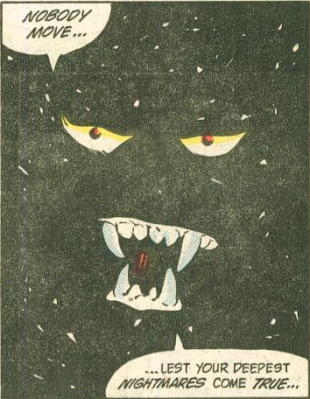 |
| Next Week... Who (or what) lurks in the Shadows? |









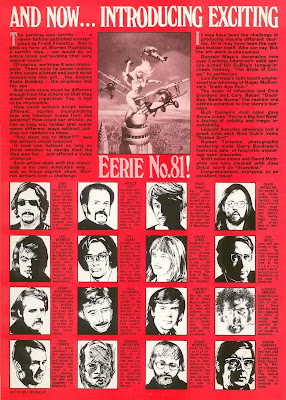


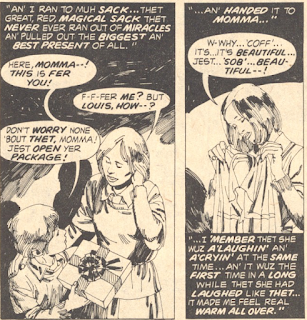






0 Yorumlar